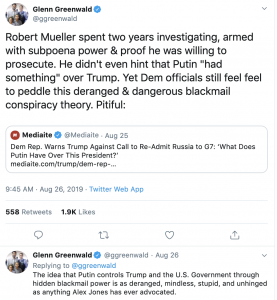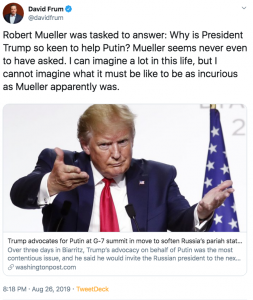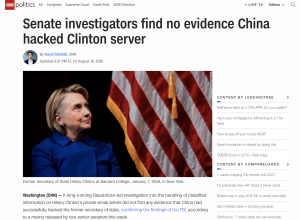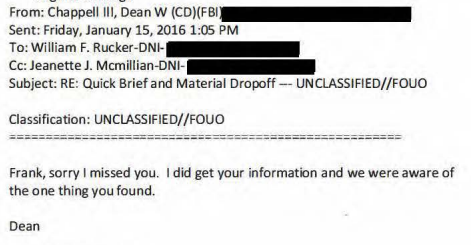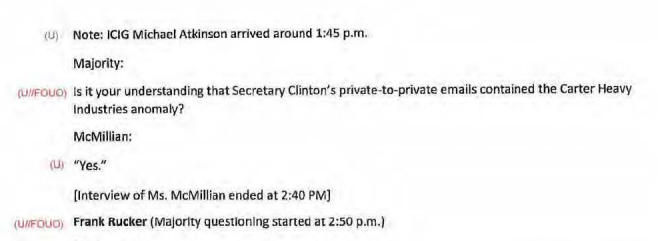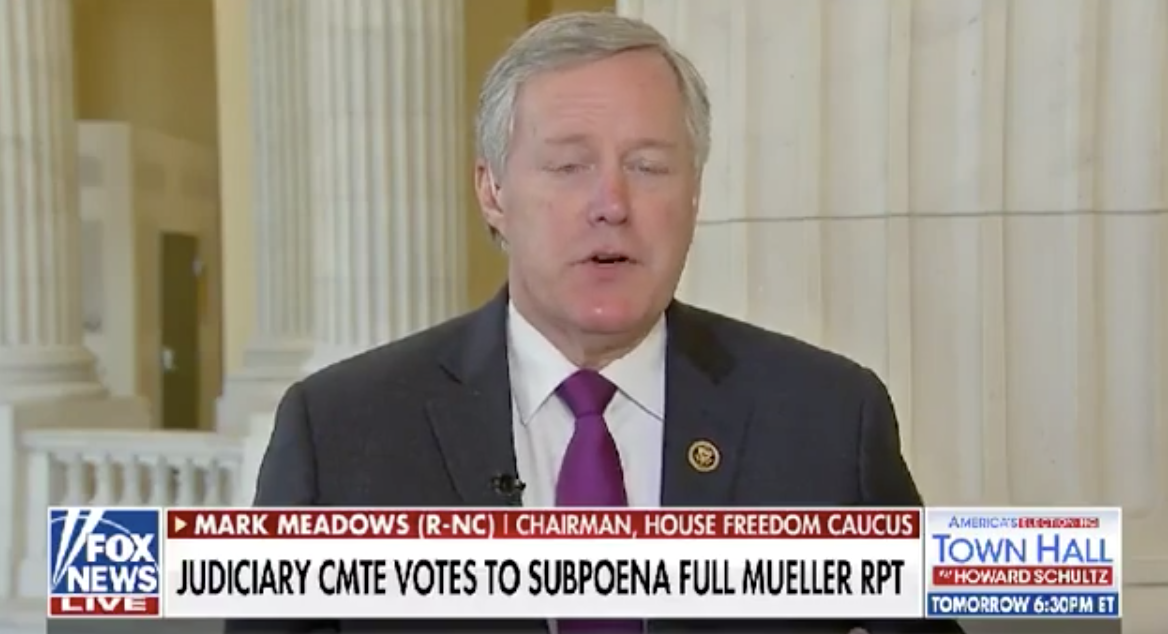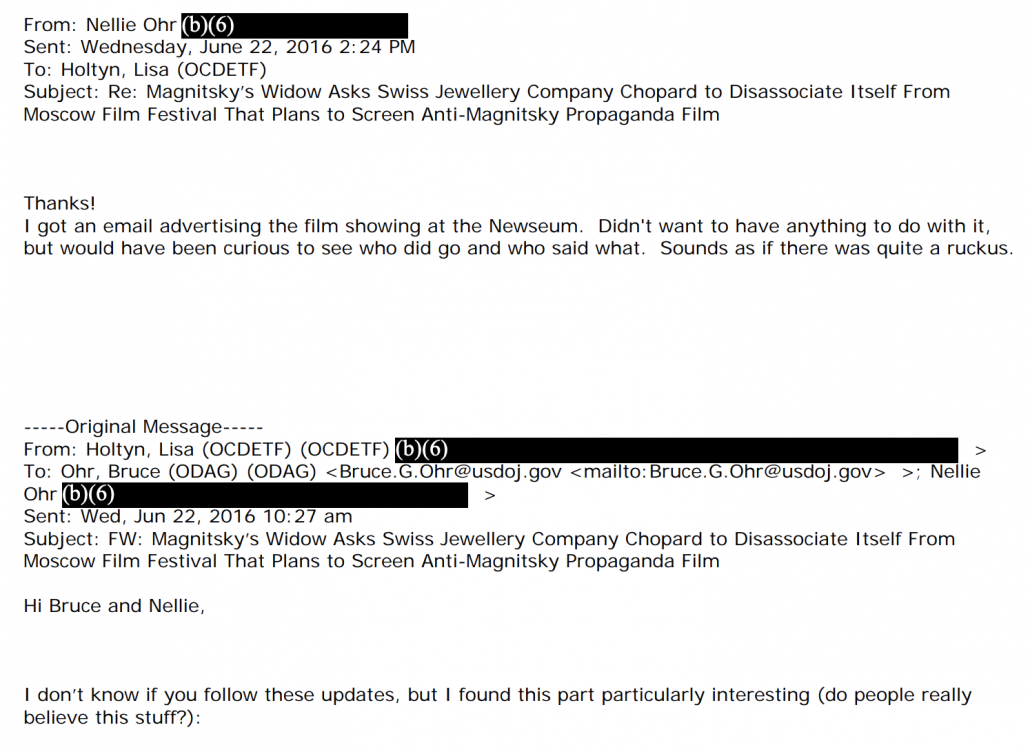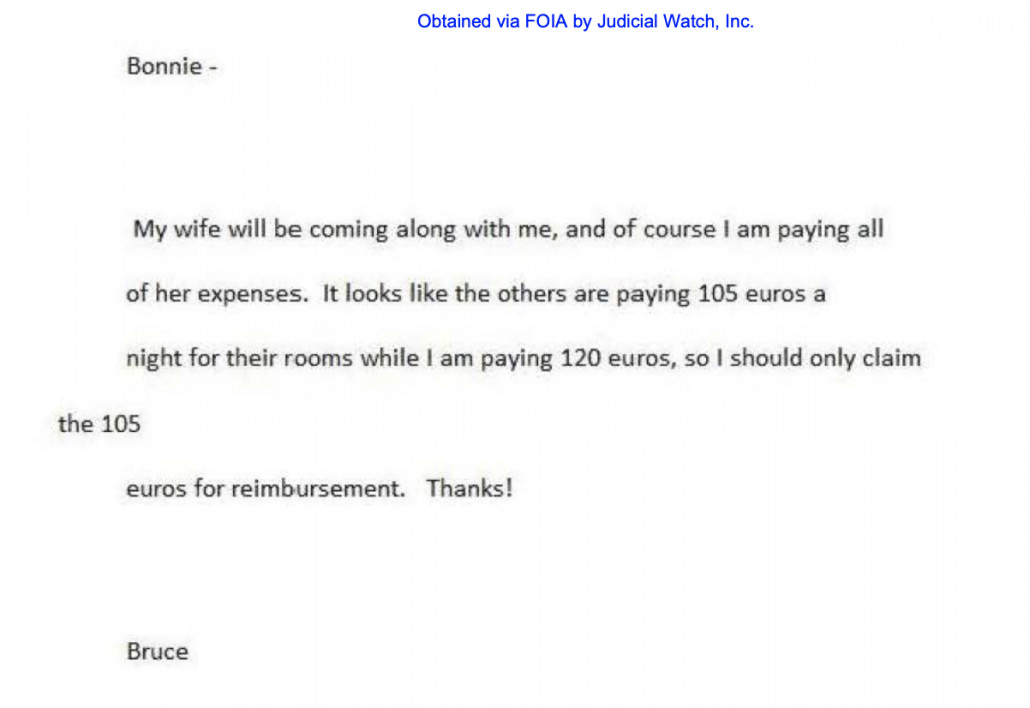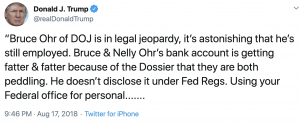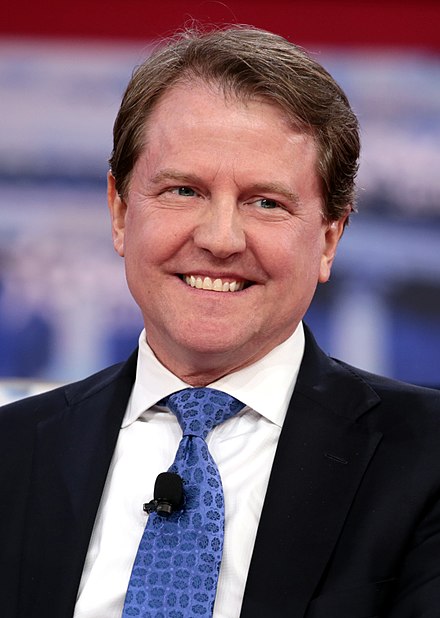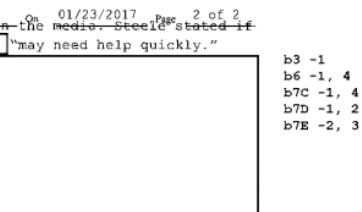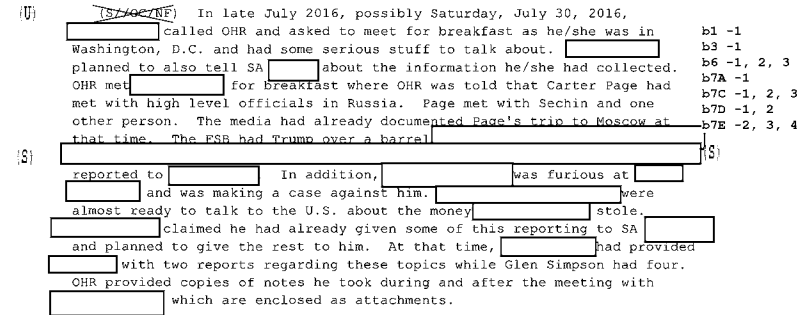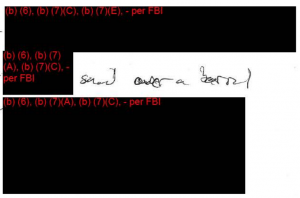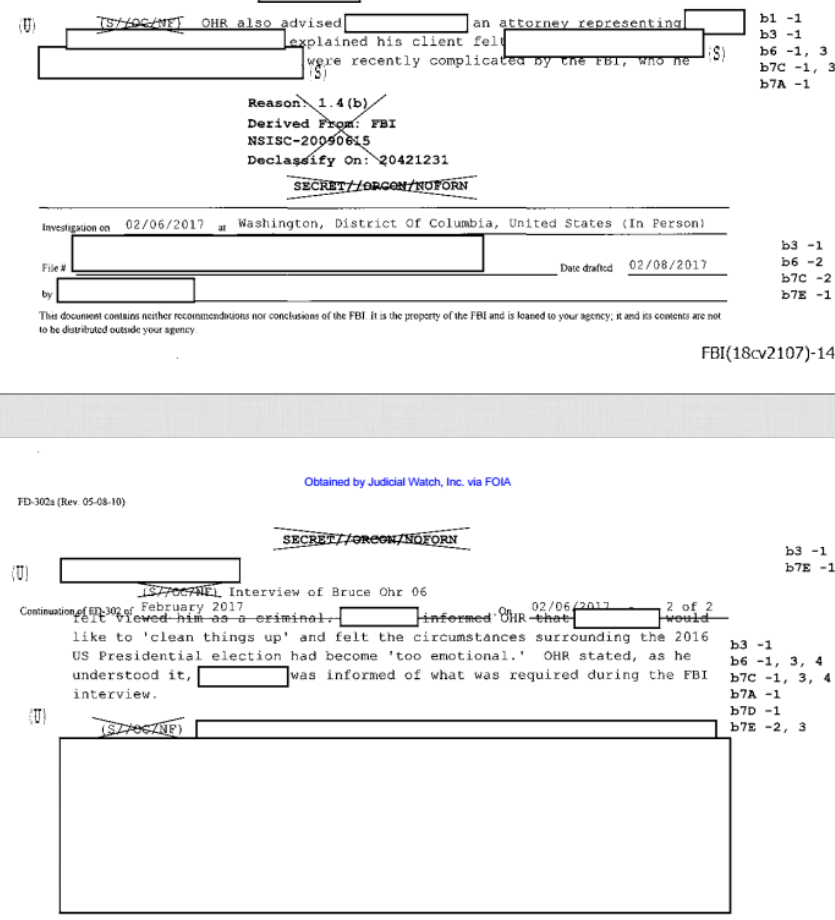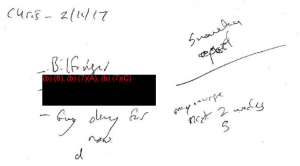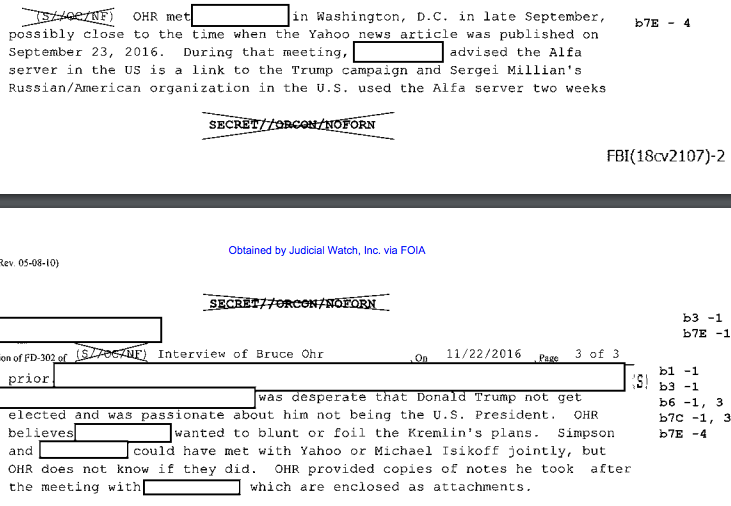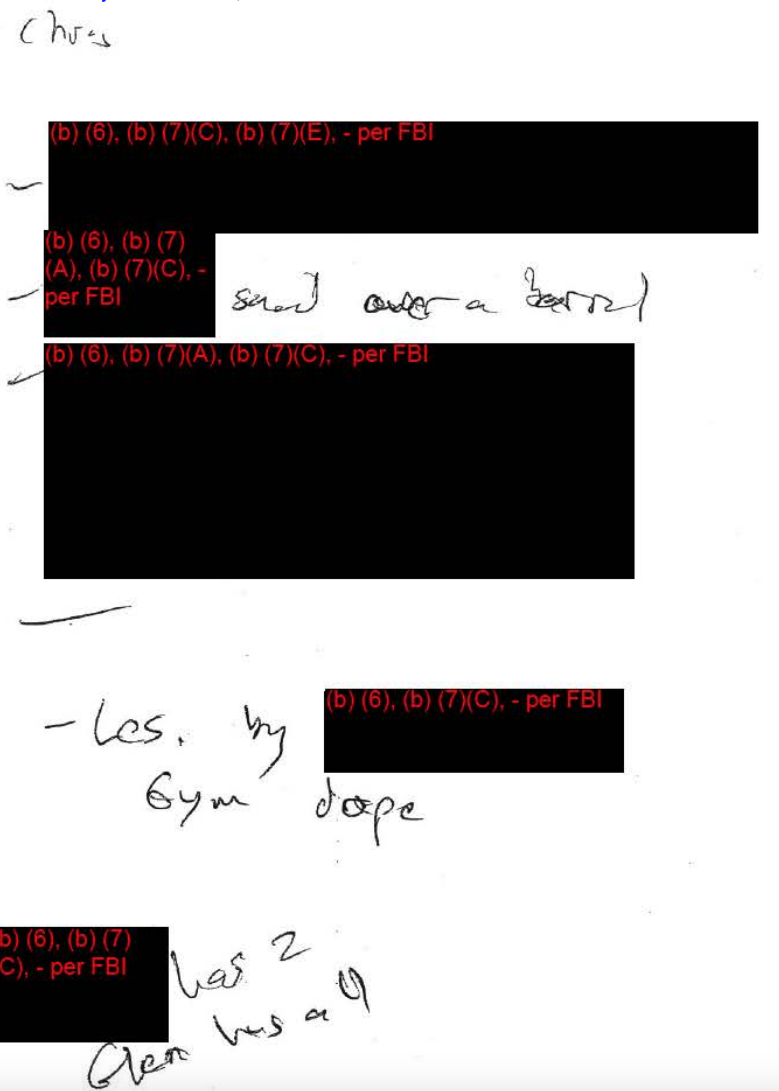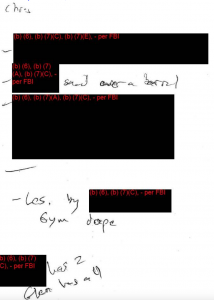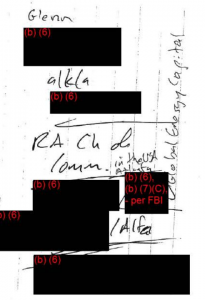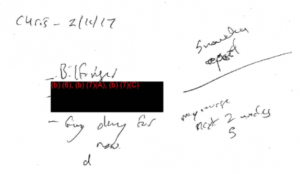Glenn Greenwald and David Frum Need to Stop Looking to the Mueller Report for FBI’s Counterintelligence Conclusions
There have been several public controversies in recent days that arise from the fact that there was a Russian counterintelligence investigation that no one sees tangible results of.
The most predictable came when Glenn Greenwald claimed Mueller’s purported silence about blackmail proved that any questions about it amounted to conspiracy mongering.
Glenn objects to John Garamendi wondering why Trump continues to push so hard to readmit Russia into the G-7. It’s a question raised by reports of how Trump’s private lobbying to readmit Russia undermined the G-7 even more than his more public lies and intransigence about other topics.
The leaders sat down Saturday evening for their first joint meeting — a dinner of Basque specialties at the foot of the landmark lighthouse of Biarritz. The meal started normally, with a discussion of the fires in the Amazon. It moved on to containing Iran’s nuclear threat. But it went off the rails when Trump blasted leaders for not including Russia.
Trump’s message was that “it doesn’t really make sense to have this discussion without Putin at the table,” according to a European official briefed on the conversation among the leaders.
The official, like others, spoke on the condition of anonymity to discuss the sharp discussions at the summit.
The entire 44-year vision of the G-7 gathering, according to the non-U. S. participants, is to hash out global issues among like-minded democracies. So the discussion quickly turned even more fundamental: Whether the leaders should assign any special weight to being a democracy, officials said.
Most of the other participants forcefully believed the answer was yes. Trump believed the answer was no. The pushback against him was delivered so passionately that the U.S. president’s body language changed as one leader after another dismissed his demand, according to a senior official who watched the exchange. He crossed his arms. His stance became more combative.
[snip]But having such a forceful advocate for an authoritarian leader inside the room of democracies profoundly shaped the overall tone of the summit, one senior official said.
“The consequence is the same as if one of the participants is a dictator,” the official said. “No community of like-minded leaders who are pulling together.”
There is another possible explanation of course: That Trump is an authoritarian, which would mean that anybody who helped him get elected had a hand in fostering authoritarianism.
That said, Glenn’s argument that Garamendi was engaging in unhinged conspiracy theories by asking the question because after 22 months of investigating, Mueller “didn’t even hint that Putin ‘had something’ over Trump” he might use to blackmail him is an outright error.
First, it assumes that Mueller would have prosecuted someone if Russia’s president had blackmail material over Trump. I’m a bit confused how this would work, even in theory. Does Glenn think Mueller is going to charge the President of Russia with a crime for pressing an advantage over the President of the United States in foreign policy? Even distinguishing blackmail (what Putin would do) from accepting a bribe (what Trump might do in response), did Glenn miss the part where Attorney General Bill Barr, whom Glenn has treated as a credible interlocutor in this matter despite his authoritarian tendencies and his history of covering up Executive abuse, took an especially hard stance against indicting a President?
It is absolutely true that the Mueller Report concluded that the available information did not support a quid pro quo conspiracy, where Russia offered to help get Trump elected in exchange for favorable treatment in the future.
[T]he investigation examined whether these contacts involved or resulted in coordination or a conspiracy with the Trump Campaign and Russia, including with respect to Russia providing assistance to the Campaign in exchange for any sort of favorable treatment in the future. Based on the available information, the investigation did not establish such coordination.
Some information that is known not to have been available to Mueller’s investigation includes an explanation for why Trump’s campaign manager was sharing campaign strategy with an Oleg Deripaska aide at a meeting where they also talked about carving up Ukraine to Russia’s liking — directly related to the event that led to Russia’s G-7 exclusion. Mueller also was unable to get any answers from Trump about discussions of sanctions relief, extending (uniquely even for Trump’s contemptuous responses) even to discussions during the campaign. Mueller also was never able to obtain a definitive answer about whether Mike Flynn asked Sergey Kislyak to hold off on responding to Obama’s sanctions with Trump’s involvement. Mueller also did not get a solid understanding of how the Transition treated Erik Prince’s discussions with Kirill Dmitriev, because both Prince and Steve Bannon deleted their texts that would have explained their inconsistent accounts. In short, Mueller did not establish a quid pro quo. But he also did not have some of the most important information he’d need to assess the question.
More importantly, a quid pro quo amounting to the crime of conspiracy — something Mueller could charge, if it involved people in addition to Trump — is a different thing than blackmail, what Glenn explicitly refers to twice in his tweets. Short of accepting a bribe, that’s a counterintelligence question, not a prosecutorial one. And the Mueller Report explicitly says that all the counterintelligence findings were not in the report, which is by regulation limited to prosecution and declination decisions.
From its inception, the Office recognized that its investigation could identify foreign intelligence and counterintelligence information relevant to the FBI’s broader national security mission. FBI personnel who assisted the Office established procedures to identify and convey such information to the FBI. The FBI’s Counterintelligence Division met with the Office regularly for that purpose for most of the Office’s tenure. For more than the past year, the FBI also embedded personnel at the Office who did not work on the Special Counsel’s investigation, but whose purpose was to review the results of the investigation and to send-in writing-summaries of foreign intelligence and counterintelligence information to FBIHQ and FBI Field Offices. Those communications and other correspondence between the Office and the FBI contain information derived from the investigation, not all of which is contained in this Volume. This Volume is a summary. It contains, in the Office’s judgment, that information necessary to account for the Special Counsel’s prosecution and declination decisions and to describe the investigation’s main factual results. [my emphasis]
If Mueller had found evidence Putin were trying to blackmail Trump, he would have treated it as a counterintelligence concern; it wouldn’t show up in the report, which is why it is so silly that Glenn suggests Mueller’s public statements would discount the possibility of blackmail. Being blackmailed is not a crime. Glenn is — as he has been since he embraced Bill Barr’s summary as a faithful report of what Mueller found — simply misrepresenting (or perhaps ignorant of) the scope of the report, even while relying on Mueller as an authority to dismiss Garamendi’s claim.
Glenn’s claims about Mueller’s silence are all the more inaccurate given Mueller’s testimony before the Intelligence Committee, which itself has a counterintelligence function. Mueller did, explicitly, state that his report does not show Trump to be an agent of Russia.
WENSTRUP: So a member of this Committee said President Trump was a Russian agent after your report was publicly released. That statement is not supported by your report, correct?
MUELLER: That is accurate. Not supported.
But that’s not what Glenn addressed, at all (and it’s also not what the the majority of concerns raised about Trump address). Glenn was making a claim about blackmail, not about being a recruited agent.
In his testimony, Mueller said something very different about blackmail. One of the biggest pieces of news that came out of that day of hearings was Mueller’s statement that the FBI continues to investigate whether Mike Flynn was susceptible to blackmail.
KRISHNAMOORTHI: Since it was outside the purview of your investigation your report did not address how Flynn’s false statements could pose a national security risk because the Russians knew the falsity of those statements, right?
MUELLER: I cannot get in to that, mainly because there are many elements of the FBI that are looking at different aspects of that issue.
KRISHNAMOORTHI: Currently?
MUELLER: Currently.
That may be consistent with reports from a period when Mueller’s investigation was done that multiple US Attorneys districts had equities in Flynn’s 302s, not to mention the disclosure that Ekim Alptekin was working to influence Trump’s policies in ways that go beyond the Gulen related contact.
As to Trump, in Mueller’s longer colloquy with Raja Krishnamoorthi, he confirmed that two potential sources of potential Trump blackmail were not addressed by the report: Trump’s financial ties with Russia and Russian money laundering using Trump businesses.
KRISHNAMOORTHI: Director, since it was outside the purview of your investigation, your report did not reach counterintelligence conclusions regarding the subject matter of your report.
MUELLER: That’s true.
KRISHNAMOORTHI: For instance, since it was outside your purview, your report did not reach counterintelligence conclusions regarding any Trump administration officials who might potentially be vulnerable to compromise of blackmail by Russia, correct?
MUELLER: Those decisions probably were made in the FBI.
KRISHNAMOORTHI: But not in your report, correct?
MUELLER: Not in our report. We avert to the counterintelligence goals of our investigation which were secondary to any criminal wrongdoing that we could find.
Then, in an exchange with Adam Schiff, Mueller agreed hypothetically that acting unethically, particularly if it involves lying about financial issues, could make someone susceptible to blackmail. When Schiff asked explicitly whether a presidential candidate lying about doing business with Russia could expose someone to blackmail, Mueller said he would, “leave that to you.”
SCHIFF: If a presidential candidate was doing business in Russia and saying he wasn’t, Russians could expose that too, could they not?
MUELLER: I leave that to you.
In other words, the most direct thing Mueller has said — after having laid out that if there were counterintelligence concerns stemming from Trump’s lies to hide his willingness to work through a former GRU officer and with sanctioned banks to make an improbably lucrative real estate deal in Moscow relying on the intervention of the Russian government, they wouldn’t be in his report — is that he would leave it to Schiff, or perhaps the House Intelligence Committee tasked with CI, to determine the CI implications of Trump’s lies about the Trump Tower deal. And yet Glenn is complaining about Garamendi raising the question that Mueller himself deferred to Congress.
If Glenn wants to treat Mueller as his authority (he actually wants to treat Bill Barr’s caricature of Mueller as his authority), then he needs to admit that, after acknowledging that the kinds of things Trump and his flunkies did and do may make them susceptible to blackmail, Mueller deferred precisely this issue, as it regards the President, to Congress. He sure as hell didn’t say concerns about them amounted to Alex Jones-worthy conspiracy mongering; he said the opposite.
And while it wasn’t asked in either of the Mueller hearings, the report does not treat two other areas investigators would need to review to determine whether or not Trump was making policy decisions based off a concern that Russia had leverage over him. Probably for very good constitutional reasons, the report doesn’t deal with actions unrelated to the investigation that Trump took as President, such as attempting to overturn the existing sanctions on Russia or slow-walking the further sanctions imposed by Congress. More specifically, however, the Mueller Report doesn’t treat the most alarming incidents between Trump and Russia: Trump’s sharing of highly sensitive Israeli intelligence in the same meeting with Sergei Lavrov where Trump boasted of firing Comey, Trump and Putin’s private conversation about adoptions during the period when Trump was penning a false statement claiming the June 9 meeting was about adoptions, and Trump’s backing of Putin’s claims about the DNC hack in Helsinki, even in the wake of the GRU indictment for the theft. They’re all (especially given precedents about the President’s role in classification decisions and foreign policy) legal, but deeply troubling from a national security perspective. That’s where any counterintelligence analysis of Trump’s compromise by Russia would start, and even though related events are treated in the Mueller Report, these specifically are not.
In short, Glenn’s comment, which would have betrayed ignorance of the scope of the Mueller Report back in March when he started making such claims, is an outright error in light of what Mueller said in Congressional testimony. To the extent anyone in government has made conclusions about Trump’s susceptibility to blackmail (and at least per Mueller’s testimony, FBI is still investigating related issues), that’s not something in the Mueller Report. It’s also not something Mueller deems conspiracy-mongering. Mueller’s report of their criminal charging decisions is by definition silent on that issue.
All that said, Glenn is not alone in this error. He’s joined by many critics of Trump’s coziness with Putin, too. Just this morning, for example, Axis of Evil scribe David Frum made precisely the error Glenn made, suggesting that the silence about counterintelligence issues in Mueller’s Report reflects any conclusion about it. He made it about the same topic, too: Trump’s insistence that Russia should rejoin the G-7.
A simple review of the report would explain that Mueller was primarily tasked to prosecute crimes, and a simple review of Mueller’s testimony — the only time he addressed this question explicitly — would show Mueller stating that, “the counterintelligence goals of our investigation which were secondary to any criminal wrongdoing that we could find.”
All that said, it is equally wrong to assume that Mueller’s team and the FBI counterintelligence agents colocated with it didn’t take particular steps to investigate counterintelligence concerns. Last night, in the wake of confirmation that Deutsche Bank had copies of Trump’s tax returns, there was a sketchy single sourced report on MSNBC (which Trump’s lawyer has just aggressively refuted; now MSNBC has retracted it) that unnmaed Russians had co-signed on some DB loans.
To be clear, there are reasons to suspect Deutsche Bank files on Trump and his son-in-law would show suspect behavior. That’s because an earlier NYT story relying on five sources, one of them named — said DB had flagged certain transactions. That report even said the DB declined to submit Suspicious Activity Reports on the transactions.
In the summer of 2016, Deutsche Bank’s software flagged a series of transactions involving the real estate company of Mr. Kushner, now a senior White House adviser.
Ms. McFadden, a longtime anti-money laundering specialist in Deutsche Bank’s Jacksonville office, said she had reviewed the transactions and found that money had moved from Kushner Companies to Russian individuals. She concluded that the transactions should be reported to the government — in part because federal regulators had ordered Deutsche Bank, which had been caught laundering billions of dollars for Russians, to toughen its scrutiny of potentially illegal transactions.
Ms. McFadden drafted a suspicious activity report and compiled a small bundle of documents to back up her decision.
Typically, such a report would be reviewed by a team of anti-money laundering experts who are independent of the business line in which the transactions originated — in this case, the private-banking division — according to Ms. McFadden and two former Deutsche Bank managers.
That did not happen with this report. It went to managers in New York who were part of the private bank, which caters to the ultrawealthy. They felt Ms. McFadden’s concerns were unfounded and opted not to submit the report to the government, the employees said.
Ms. McFadden and some of her colleagues said they believed the report had been killed to maintain the private-banking division’s strong relationship with Mr. Kushner.
After Mr. Trump became president, transactions involving him and his companies were reviewed by an anti-financial crime team at the bank called the Special Investigations Unit. That team, based in Jacksonville, produced multiple suspicious activity reports involving different entities that Mr. Trump owned or controlled, according to three former Deutsche Bank employees who saw the reports in an internal computer system.
Some of those reports involved Mr. Trump’s limited liability companies. At least one was related to transactions involving the Donald J. Trump Foundation, two employees said.
Deutsche Bank ultimately chose not to file those suspicious activity reports with the Treasury Department, either, according to three former employees.
That said, these sources all seem to have reviewed the actual transactions, and there’s nothing as inflammatory as a Russian co-signer. Lawrence O’Donnell’s source reportedly has not seen the documents.
More importantly, the belief there’ll be some criminal hidden grail in Trump’s finances assumes that Mueller never got any of his finances. In the same Intelligence Committee hearing, Mueller declined to comment on whether he had obtained Trump’s tax returns and other financial documents.
KRISHNAMOORTHI: And of course your office did not obtain the president’s tax returns which could otherwise show foreign financial sources, correct?
MUELLER: I’m not going to speak to that.
KRISHNAMOORTHI: In July 2017 the president said his personal finances were off limits, or outside the purview of your investigation and he drew a “red line,” around his personal finances. Were the president’s personal finances outside the purview of your investigation?
MUELLER: I’m not going to get in to that.
KRISHNAMOORTHI: Were you instructed by anyone not to investigate the president’s personal finances?
MUELLER: No.
Mueller did base some of his investigation off of SARs referrals (which, obviously, he wouldn’t haven’t obtained if DB was sitting on them until this got reported several months after Mueller’s investigation shut down); that’s where the investigation of Michael Cohen began. Any investigation into Jared Kushner’s discussions of back channels involving sanctioned Russian banks would surely have subpoenaed bank records. Furthermore, Mueller obtained at least Cohen’s Trump Organization email without asking for it from the company itself (and preserved all of it as soon as he learned about the June 9 meeting).
In other words, there’s a counterpart to those — like Glenn and Frum — erroneously making claims about Mueller’s counterintelligence conclusions based on what is in the report. That’s people assuming that certain kinds of investigation wouldn’t have happened, when we know some form of one did.


